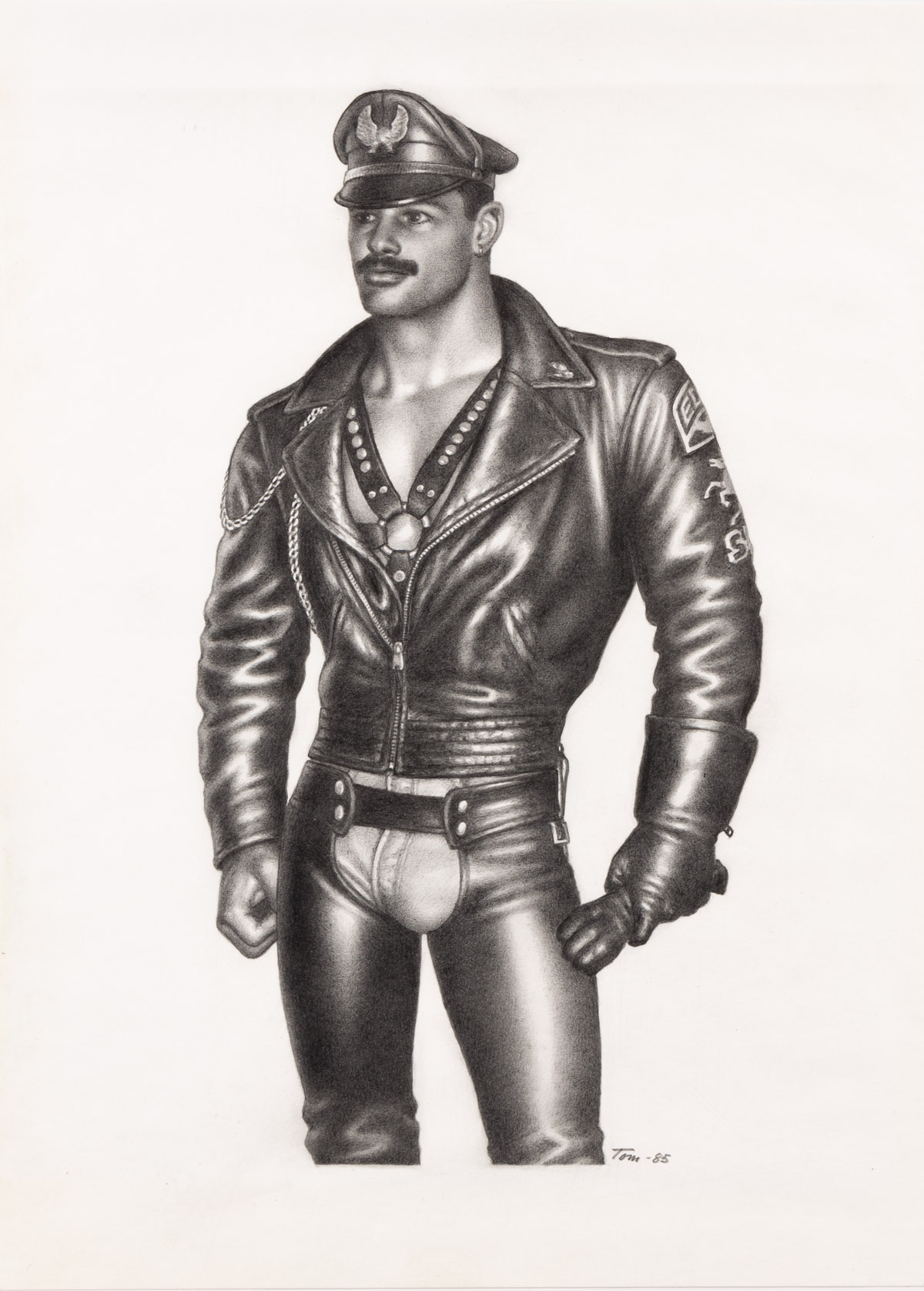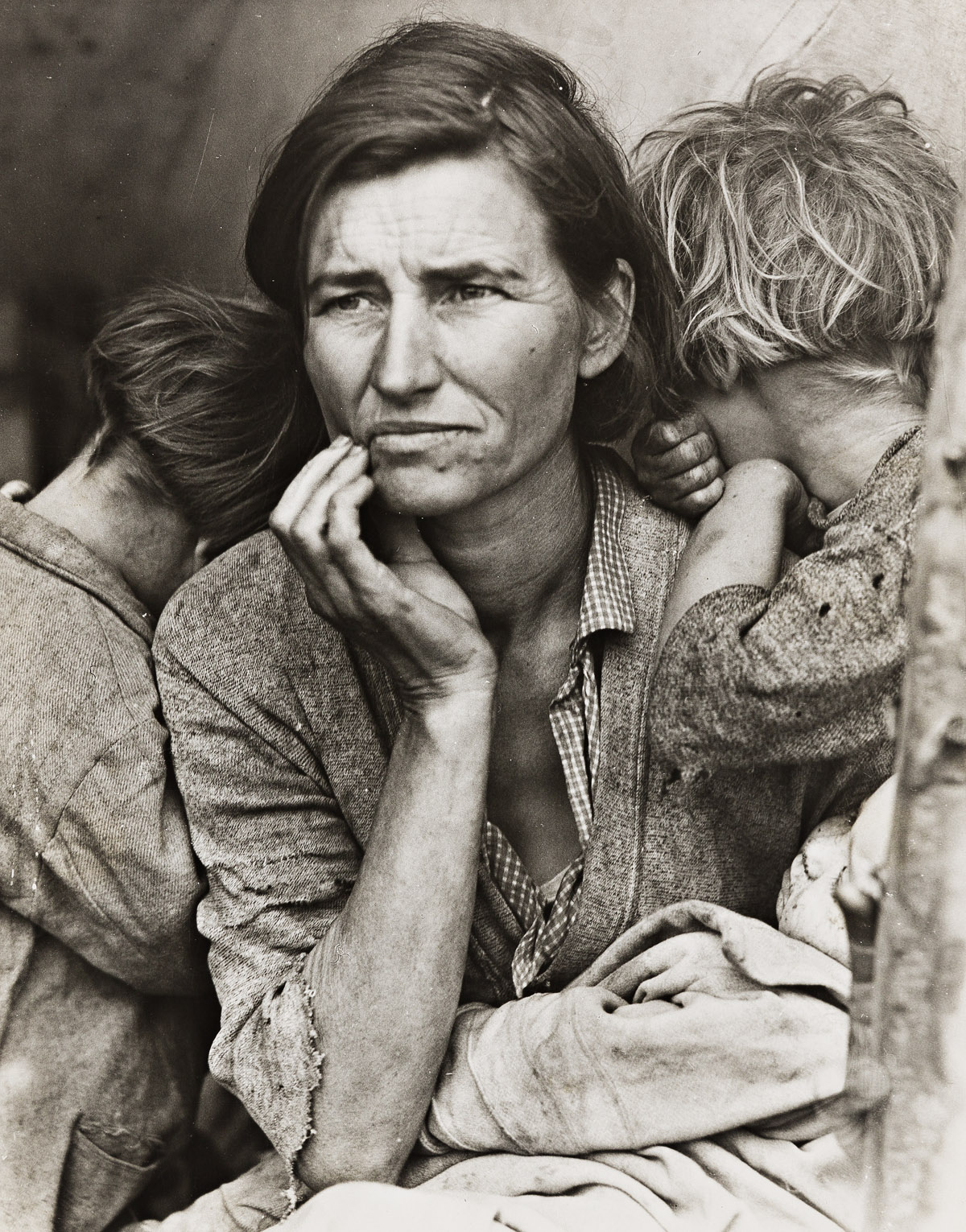Stompers Gallery & Its Leather Fetish Art Lineage
Stompers, a West Village boot store, was owned by classical composer Louis Weingarden. The store also featured a gallery in the backroom of its retail space at 259 West Fourth Street that exhibited leather fetish art. Weingarden exhibited many artists and illustrators in its circle, including Tom of Finland, Domino, and Rex.
In 1978, Weingarden started the Stompers Gallery in New York City to showcase homoerotic artwork. He was the first person to foster an environment where buyers and sellers could come together without persecution—it was legal (though still taboo) in NYC, unlike the rest of the country.
Weingarden was also the first to give Tom of Finland an exhibit in the USA, which saw a number of prominent attendees, including Andy Warhol. Over the years, Weingarden continued to invite artists working in the same style to show their pieces until he and his partner passed away in 1989 from AIDS-related complications, leaving no one to continue the gallery. Prior to his passing, he left a friend the art he had accumulated over the years, which was recently exhibited and auctioned at Circus of Books in West Hollywood, CA, in late 2023.
Below is a selection of artists who exhibited at Stompers and captured the homoerotic leather scene.
Tom of Finland (1920 – 1991)

The most notable artist in the lineup is Tom of Finland. He first exhibited at Stompers in 1978 in a group exhibition with Etienne.
The strict obscenity laws in Finland restricted Tom’s growing talent and it was not until submitting his work to the body-building magazines in America that Tom finally found a commercial and creative outlet. The tame photographs and drawings in their pages allowed him to celebrate the beauty of the male form in the American spirit of sport and the outdoors. His first drawing showed a brawny Finnish logger, hinting at symbolism to come.
From a distance, then, he was keeping pace with American gay liberation and cultural shifts. His leather and boot fetish dovetailed with the rise of the rougher male sex symbol in American movies, most notably the outlaw biker as portrayed by Marlon Brando in The Wild One. In addition to his military men, the biker was a theme that would dominate much of his work.
When he arrived in California in 1977, it was no surprise that he was immediately embraced by a community that viewed him as a paragon of gay pride. He settled in California for the remainder of his life, serving as a quiet but steady mentor.

Rex (1943 – 2023)

Rex is an American artist and illustrator closely associated with homosexual fetish and S&M subculture art of the 1970s and 1980s in New York and San Francisco. His graphic work for famous gay nightclubs like Mineshaft and The Saint and sex shops such as The Pleasure Chest and The Trading Post, as well as his calendar, magazine, and poster illustrations, led to his increasingly widespread popularity, influencing emerging artists, including Robert Mapplethorpe. In 1976 he issued a bound portfolio entitled Männespielen. Following its success, he issued eight unbound portfolios of his drawings via mail order. While individual prints can still be found, the portfolios are now quite rare and scarcely found in their entirety.
Domino (1929 – 1990)
Domino (Donald Merrick) was born in Minnesota in an iron mining town where the aesthetic of the workers influenced his practice and aesthetic desires. Leather jackets, mud-covered boots, and the uniform of Army base recruits followed him throughout his life. Domino earned a bachelor’s degree in art at the Chicago Art Institute and a master’s at the University of New Mexico. He taught art at the University of Missouri and the Virginia Commonwealth University in Richmond and was appointed the head of the art department at Farleigh-Dickerson University in Rutherford, New Jersey, in 1963.

The mid-1960s were his artistic and personal awakening. Through his self-exploration and increased focus on his creative practice, he was given the opportunity to show his work at Stompers Gallery in December 1978, and later at Fey Wey Studios in San Francisco in 1979.
Blade (1916 – 1989)

Neel Bate was known as “Blade,” as he signed this drawing. He was an American underground artist of gay erotic art whose career began in the 1930s and is best known for his 1948 series of drawings, “The Barn.” Like many artists, his work was initially distributed underground as a result of American obscenity laws. His first one-man show was held at the Leslie-Lohman Gallery in SoHo in November of 1980. Its success launched him into greater popularity and his most artistically productive decade. Bate died on June 27, 1989, the twentieth anniversary of the Stonewall riot.
Andrew J. Epstein (1949 -)

Since the late 1960s, Andrew J. Epstein has photographed LGBTQ+ communities and events in Chicago, New York, and Los Angeles. He has also worked as an art director and graphic designer for numerous publications. In 1978, he participated in an exhibition at Stompers Gallery with Tom of Finland and Etienne.
Etienne (1933 – 1991)
Dom Orejudos used both the pen names Etienne and Stephen, each a variant of his true middle name, Esteban.

Etienne trained as a ballet dancer, was a prominent member of the Illinois Ballet Company, and continued to create ballets throughout his life. He began his commercial art career in 1953 as an illustrator. Along with George Quaintance and Tom of Finland, Etienne was an early progenitor of male erotic art. His prominent affinity for leather became a hallmark of his work.
Additional artists who contributed to the leather culture in a profound and meaningful way include Chuck Arnett, The Hun, Jim French, Thor, Teddy of Paris and Martin of Holland.










![Grace Meschery-McCormack shares about two copies of Fernando de Rojas’s ‘La Célestine,’ including a limited edition copy illustrated by Pablo Picasso.
At auction April 22. Learn more about the works at the link in our bio.
#Rarebooks #rarebookdealer #antiquarianbooks #auctions
_______________________________________
Music Credit:
Schubert - Piano Quintet in A major ‘The Trout’, D. 667 - IV. Andantino – Allegretto
Music provided by Classical Music Copyright Free on Youtube [https://tinyurl.com/visit-cmcf]
Watch: • Schubert - Piano Quintet in A major ‘...]](https://scontent-iad3-1.cdninstagram.com/v/t51.75761-15/491443494_18499096345036585_5935932878956098058_n.jpg?stp=dst-jpg_e35_tt6&_nc_cat=107&ccb=1-7&_nc_sid=18de74&_nc_ohc=AZ-awqelOZgQ7kNvwFA19hE&_nc_oc=AdkZVODYB5VxTPck7kaEV8QTzHwvQLzaAjo_r9W39mgpTAk2Ix_Bp7bj2bTOpAdxWZY&_nc_zt=23&_nc_ht=scontent-iad3-1.cdninstagram.com&edm=AM6HXa8EAAAA&_nc_gid=WYEcU6gC5TqWZD5uMxPhZg&oh=00_AfGiGi_LSZupgOmG9-F7SuCrqswGM5UOV8BXCEkXVaN-Cw&oe=680DB7D1)








